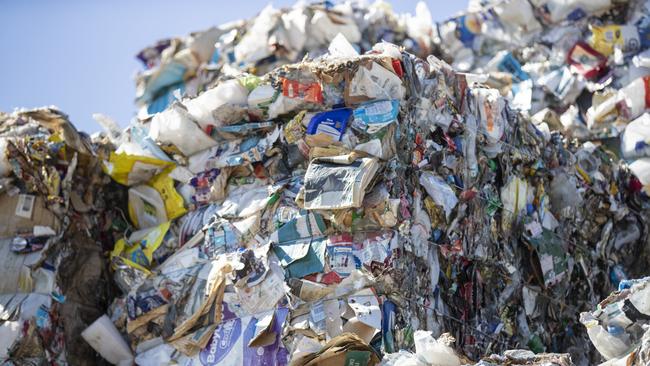Tom Minear: Bag ban mustn’t be a waste of our time
Single use plastic bags will be banned in Victoria from next week but the ban, and recycling in general, raises questions, writes Tom Minear.

Opinion
Don't miss out on the headlines from Opinion. Followed categories will be added to My News.
Pay close attention when you pick up takeaway for dinner this Friday. Why? Because it will no longer be legal for your favourite fish and chip shop to put your flake and potato cakes in a “single-use” plastic bag.
From November 1, the common white and grey lightweight bags are banned in Victoria. Speaking to retailers and customers, it seems not everyone is prepared for the law to change — and some do not even know it is happening.
It’s easy to see how we ended up in this situation. When Coles and Woolworths stopped offering single-use bags, Victorians were forced to change their behaviour, buying fabric or thicker plastic alternatives to carry their groceries. Many of us still forget to take our bags with us to the supermarket, but we all know that’s now our only option.

Major retail chains have also long offered sturdier plastic and paper bags to lug around our shopping.
You could be mistaken for thinking single-use bags were illegal already. After all, the Andrews Government promised to do that two years ago. But it’s easy to find fast-food restaurants, newsagents and chemists where they are freely handed out, with no warning of the impending change.
The Australian Retailers Association has been writing to the Environment Protection Authority for weeks, warning that thousands of shops have received no information from a statewide bag ban education campaign.
So what will happen on Friday? Inspectors won’t rush in and start slapping fines — of up to $49,500, mind you — on mum-and-dad small businesses.
After the Herald Sun revealed Bakers Delight had been given a grace period to use up its single-use bags, Premier Daniel Andrews confirmed a “common sense approach” would be taken rather than a “punitive approach”. It poses the question — will the laws ever be policed or are they more designed to drive cultural change?

For years, smoking has been banned at beaches, tram stops and school entrances, but those who continue to puff away are rarely, if ever, punished.
Enforcement is a bureaucratic muddle across many agencies and levels of government, with the hard work essentially left to no-smoking signs to remind people not to light up.
Perhaps the EPA will take the same approach with plastic bags, gently alerting retailers to the ban until most are complying.
Consumers will adapt quickly too.
Banning plastic bags has been a popular idea for a while and although there will be some initial inconvenience, most of us will learn to live without carrying home our dumplings and fried rice in a plastic bag.
The bigger issue — practically and environmentally — will be how Victorians adapt to the other situations where we use plastic bags, like walking the dog, taking leftovers to work for lunch and lining bins. Calling them “single-use” is a misnomer in that sense and it would be a shame if the ban led to people buying even more bags for other reasons.
While we get our heads around this Friday’s change, Environment Minister Lily D’Ambrosio will also be thinking about where the government goes next on plastic pollution.

In the background, a taskforce of government, industry, community and environmental figures has been putting together a plan to “prioritise the most effective actions to reduce other types of plastic pollution”.
It wouldn’t be a surprise if they had a crack at the smaller bags used to pick up fruit and vegetables, or even the thicker plastic alternatives from supermarkets now building up in our car boots and cupboards.
A recent trip to the shops made me wonder if Coles and Woolworths were already preparing for those changes.
The number of pre-chopped vegetable and salad options seems to grow by the week, perhaps in an effort to train shoppers to buy already-packaged produce, in case they are forced to go without bags for their whole carrots and potatoes.
Ultimately, the success or otherwise of the government’s plastic pollution crackdown rests more on bottom-up behavioural change than top-down laws.
Andrews has rightly argued Victorians want to do the right thing by the environment and are willing to make changes.
But the government has tested the patience of even the greenest Victorians. The collapse of recycling giant SKM was years in the making and yet the government failed to stabilise the system before thousands of tonnes of recycled waste was sent to landfill.

Andrews and D’Ambrosio are now making all the right noises about creating a circular economy to improve the sorting, collection and reuse of recyclable materials.
Last week, they received Infrastructure Victoria’s draft recommendations to overhaul the system, including households sorting their waste into six bins — for normal rubbish, organics, plastics, glass, metals and paper. Those reforms, worthy as they may be, will require even more radical behavioural change.
MORE: RECYCLING RESTARTS AT FIVE COUNCILS
How will we reorganise to fit in all those bins? Will we remember which bottle goes where? Will there even be enough room in our driveways and backyards for six bins?
It took the government two years to ban single-use bags, so it is hard to imagine these changes will happen overnight.
Victorians are probably up for the challenge but the government must take the lead.
If we give up plastic bags, we want to be sure retailers aren’t allowed to flout the ban and if we recycle properly, we want to know our waste isn’t stockpiled and burned.
Otherwise, voters may see well-intentioned policies as token empty gestures making their lives harder.
Labor’s environmental credentials are at stake — and there’s a fine line between trash and treasure.
Tom Minear is state politics editor.

